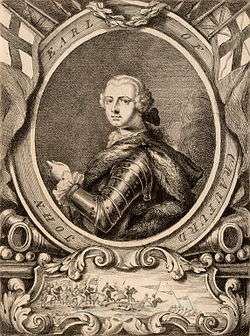John Lindsay, 20th Earl of Crawford
Lieutenant-General John Lindsay, 20th Earl of Crawford (4 October 1702 – 25 December 1749) was a Scottish peer and the first colonel of the Black Watch on its formation in 1739.

Biography
Lindsay was the son of Lieutenant-General John Lindsay, 19th Earl of Crawford and Emilia Stuart and inherited his titles on the death of his father in 1714.[1] He was educated at University of Glasgow and the Vaudeuil Military Academy, Paris.
The Earl of Crawford was commissioned into the 3rd Foot Guards in 1726, but later served in the Austrian and Russian armies before returning to Britain and taking command of the Black Watch (1739–1740). He was then Colonel of the 2nd Troop of Horse Grenadier Guards (1740–1743) and Colonel of the 4th Troop of Horse Guards ('Scottish Horse Guards') (1743–1746), fighting at the Battle of Dettingen on 16 June 1743. He gained the rank of Brigadier-General in 1744 and Major-General in 1745. He fought in the Jacobite rising of 1745 and the Battle of Fontenoy on 30 April 1745.
Crawford was Colonel of the 25th Foot (1746–1747). He fought in the Battle of Rocoux on 11 October 1746 and gained the rank of Lieutenant-General in 1747. He was Colonel of the 2nd Dragoons ('Scots Greys') (1747–1749)
In 1732 Crawford was elected a Fellow of the Royal Society. In 1734 he was Grand Master of the Premier Grand Lodge of England.
Family
Crawford had married Lady Jean Murray, daughter of Lieutenant-General Sir James Murray, 2nd Duke of Atholl, in 1747 but she died only nine months after their marriage. He died on 26 December 1749 from a leg wound received at the Battle of Krotzka in 1739. He was the last member of the Lindsay family to be buried in the mausoleum in the cemetery at Ceres, Fife, Scotland.
Bibliography
| Military offices | ||
|---|---|---|
| New regiment | Colonel of the 42nd Highland Regiment of Foot "Black Watch" 1739–1741 |
Succeeded by The Lord Sempill |
| Preceded by The Earl of Effingham |
Captain and Colonel of the 2nd Troop Horse Grenadier Guards 1740–1743 |
Succeeded by The Lord Tyrawley |
| Captain and Colonel of the 4th (Scots) Troop Horse Guards 1743–1746 |
Troop disbanded | |
| Preceded by Hugh Sempill, 12th Lord Sempill |
Colonel of The Earl of Leven's, or Edinburgh, Regiment of Foot 1746–1747 |
Succeeded by William Maule, 1st Earl of Panmure |
| Preceded by The Earl of Stair |
Colonel of the Royal Regiment of North British Dragoons 1747–1749 |
Succeeded by The Earl of Rothes |
| Peerage of Scotland | ||
| Preceded by John Lindsay |
Earl of Crawford 1713–1749 |
Succeeded by George Lindsay-Crawford |
| Masonic offices | ||
| Preceded by James Lyon, 7th Earl of Strathmore and Kinghorne |
Grand Master of the Premier Grand Lodge of England 1734 |
Succeeded by Lord Weymouth |